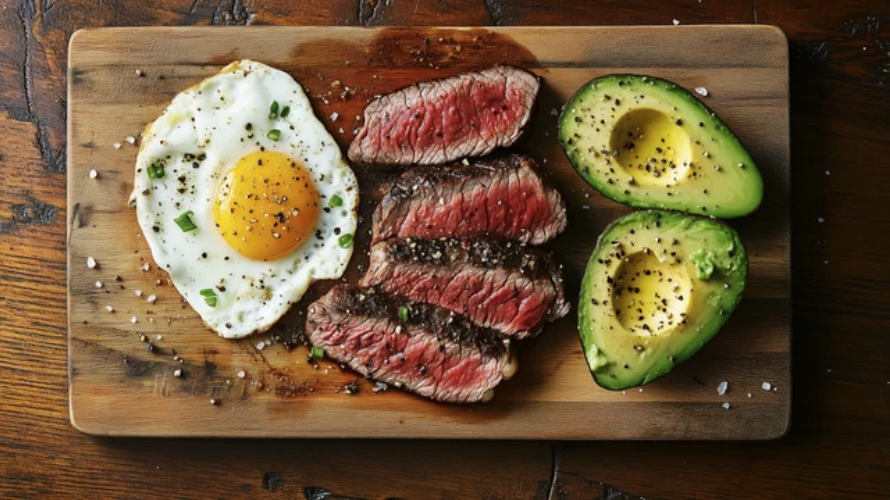Muscle isn’t built in the gym—it’s built in the kitchen. If you are serious about gains, here’s the
blueprint for eating big, clean, and smart.
How to Eat to Build Muscle
Fuel Like a Savage. Grow Like a Beast.
You’re lifting 3–5 days a week. You’re hitting 8–10 reps to failure, hammering multiple body parts per session. You’re pushing yourself hard—and that’s great. But here’s the cold truth:
If your diet isn’t dialed in, your gains will be microscopic.
Muscle isn’t built in the gym. It’s built at the dinner table, in the kitchen, and at every meal in between. No matter how hard you bust your ass under the bar, if you’re not feeding those muscles correctly—they won’t grow. Period.
And that means all that sweat, pain, and sacrifice? Wasted.
Here’s the deal: You have to eat. A lot. And not just anything—you have to eat the RIGHT STUFF. According to the latest weightlifting science and real-world data from elite coaches and lifters, your results come down to smart, aggressive nutrition. And let’s be honest—eating right is often harder than the lifting.
But you’re here to grow. So let’s break it down.
 1. Protein: The Cornerstone of Growth
1. Protein: The Cornerstone of Growth
The golden rule: Eat at least your body weight in grams of protein per day—MINIMUM. That’s non-negotiable. If you’re 180 pounds, that’s 180 grams of protein. AT LEAST. But if you want to actually grow, aim for 1.3 to 1.5 grams per pound of body weight. That means 200–230g for the average lifter.
if you’re not a label reader, you need to become one — TODAY. Know what’s going into your body. Every gram counts.
Pro Tip: Distribute protein evenly across 4–5 meals. The body absorbs and utilizes protein better that way.
2. Smart Calories: Fuel with Purpose
You need carbs and fats—but not junk.
Carbs (Fuel + Recovery):
Brown rice
Quinoa
Sweet potatoes
Oats
Berries and bananas (pre/post workout)
These provide sustained energy, glycogen replenishment, and support intense lifting sessions.
Fats (Hormone Support):
Avocados
Olive oil
Nuts (almonds, walnuts, macadamias)
Whole eggs
Fatty fish (salmon, sardines)
Testosterone production and recovery depend on healthy fats. Skip the seed oils and processed garbage.
Vegetables (Nutrient Density + Gut Health):
Spinach, kale, arugula
Broccoli, asparagus, zucchini
Peppers, onions, mushrooms
Fiber-rich, antioxidant-packed, and critical for digestion and immune strength.
3. Protein Sources: Quality Over Quantity
Top-Tier Protein:
Grass-fed beef and steak
Organic chicken
Wild-caught fish (salmon, tuna, cod)
Turkey
Cage-free eggs
Greek yogurt & cottage cheese
Bone broth
Whey protein isolate (post-workout)
Casein protein (before bed)
Beans & legumes (supplemental, not primary)
Avoid These Meats When Possible
Processed Meats
Includes deli meats, hot dogs, Slim Jims, gas station meat sticks, and most sausages with nitrates. These are chemical bombs—loaded with sodium, preservatives, fillers, and hormone-disrupting additives.Canned & Pre-Packaged Meats
Tuna or chicken packed in low-grade oils and salt-heavy brines. Shelf-stable usually means shelf-poison. Always read the label.Frozen Breaded Meats
Chicken tenders, nuggets, and fish patties—coated in junk carbs and fried in industrial oils. Your gut and hormones hate them.Pre-Marinated Grocery Store Meats
Looks convenient, but it’s often a chemical cocktail of sugar, MSG, and fake flavorings.Fast Food & Mechanically Separated Meats
From mystery-meat burgers to “chicken” sandwiches—cheap cuts, soy fillers, emulsifiers, and meat paste. If it came from a drive-thru, skip it.Low-Grade or Unspecified Ground Meats
If it doesn’t name the cut—assume it’s scraps and saturated fat held together with hope and seasoning.Imitation Seafood
Crab sticks and “surimi” are ultra-processed, sodium-loaded knockoffs with zero real nutrition.
Rule of Thumb
If it’s cheap, lasts forever without refrigeration, or has more ingredients than a chemistry exam—leave it on the shelf.
Stick with whole, clean, high-quality meat sources. Eat like a predator, not a lab experiment.
4. Water: Your Anabolic Weapon
You need more than you think. Hydration affects protein synthesis, performance, digestion, and energy.
The Rule: Drink at least a gallon a day, or aim for half your body weight in ounces. For example: a 180 lb man = 90 oz of water/day.
If you’re training hard and sweating more—up it. Keep a water bottle on you like it’s your sidearm.
Pro tip: “If you’re drinking over a gallon a day, consider adding electrolytes (like sodium or magnesium) to avoid flushing essential minerals.” Two great options are LMNT Electrolyte powder or Liquid IV
5. Fiber: Don’t Skip It
Fiber keeps your digestion on point and your blood sugar steady. You want your nutrients absorbed efficiently—not stuck in your gut.
Best Sources:
Chia seeds
Flaxseed
Oats
Broccoli
Leafy greens
Berries
Avocados
Psyllium Husk Supplements
Aim for 30–40g of fiber daily. Mix it across meals and keep your gut bulletproof.
Pro Tip: Add 5–10g of psyllium husk to your protein shake to boost fiber, improve digestion, and maximize nutrient absorption—but drink it fast, because it thickens quickly. Start with 5g to assess tolerance; jumping to 10g too soon can cause bloating.
6. Foods to Limit or Eliminate
You already know what’s coming:
High-Sugar Junk:
Soda
Ice cream
Donuts
Cookies
Cereal
Candy
The list goes on, and you know what’s on it.
Occasional treats? Sure. But treat them like rewards—not habits. Every soda is a step away from visible abs. Choose wisely. If you’re serious about getting lean and seeing that six-pack, it’s going to take sacrifice.
Pro Tip: Every time you reach for that soda or bowl of ice cream, ask yourself—Do I want to consume this and get my dopamine hit, or do I want to have six pack abs? YOU CAN’T HAVE BOTH. Sorry bro. So make your choice and live with it.
Absolutely—here’s a condensed and polished version in Ultra Male style, with a sharp Pro Tip at the end:
7. Alcohol: The Muscle Killer
Let’s keep it real—alcohol works against your gains. It disrupts hormone production, crushes recovery, wrecks sleep, and dehydrates you at a cellular level.
Yes, you can enjoy a drink once in a while. But this is where discipline and moderation separate the serious from the soft.
Beer is the worst—loaded with calories and estrogenic compounds. Sugary cocktails are no better.
If you must, go with clear spirits, low-sugar mixers, or a glass of red wine—and keep it occasional.
A hard week of training followed by a binge weekend? That’s a self-sabotage cycle. You’re taking five steps forward, one sloppy step back.
And in this game, that adds up.
Pro Tip: Every drink is a trade-off—strength or softness. If you want to build muscle and get lean, act like it. You don’t need to quit drinking, but you do need to own the cost.
8. By the Numbers: Structuring Your Meals
Eat 4–5 meals per day, spaced every 3–5 hours. Each meal should include:
- 30–40g of high-quality protein
- 1 serving of complex carbs
- 1–2 servings of vegetables
- A dose of healthy fat or added fiber
This combo keeps your metabolism firing, your muscles fed, and your gut dialed in.
Sample Ultra Male Meals:
- Turkey + spinach omelet + Greek yogurt
- Grilled chicken + brown rice + broccoli
- Salmon + sweet potato + avocado
- Whey protein shake + banana + chia seeds
- Grass-fed beef + roasted carrots + quinoa
- Ground turkey stir-fry with peppers + jasmine rice
- Tuna + chickpea salad with olive oil + arugula
⚙️ Do the Math. Dominate the Results:
40g of protein × 5 meals = 200g per day. That’s your target if you weigh 180 pounds. Heavier or lighter? Adjust accordingly. You’re a smart guy—you know the drill.
Stay consistent. Stay sharp.
Your muscles grow from nutrients—not just effort.
Train like a beast. Fuel like a weapon.
9. Sleep: The Forgotten Superpower
It’s not eating—but it’s just as critical.
Sleep is one of the most important factors in muscle growth and recovery. Without it, your hormones tank, your recovery stalls, and your gains vanish.
Aim for 7–9 hours every night. No excuses.
We get it—life’s busy, chaotic, sleep is a luxury. But if you’re serious about building muscle and staying sharp, you need to FIGHT for that quality sleep like your progress depends on it—because it does.
Pro Tip: For deeper, anabolic sleep—cut the blue light an hour before bed that means NO SCREENS. Keep your room cool and pitch black (invest in blackout curtains). Wind down, relax, and stick to a consistent sleep schedule. Routine, darkness, and cool temps are your recovery weapons.
10. Schedule: When You Eat Matters
Meal timing isn’t just for bodybuilders—it’s for any man who wants results. Yes, eating 4–5 protein-rich meals a day takes planning. But it’s doable with discipline and a little hustle.
Carry a high-protein bar in your bag.
Keep prepped meals or microwavable options on deck.
Even gas stations have Greek yogurt, boiled eggs, jerky—In a pinch, no excuses.
Pre-Workout:
Don’t train fasted. Muscles need fuel to perform. Eat a solid meal 60–90 minutes before lifting to power through your session.
Post-Workout:
This is your golden window. Get a fast-absorbing protein shake in right after your lift—this is when your body is begging for nutrients. Feed it.
Before Bed:
Avoid heavy meals late at night. If you need something, keep it light and muscle-friendly—like a casein shake, Greek yogurt, or cottage cheese.
Final Word: You Can’t Outlift a Crap Diet
Muscle is earned twice—once in the gym, once in the kitchen. You’re training hard. You’re dialed in. Now fuel like it.
Here’s a downloadable 7 day meal plan. Enjoy. (DOWNLOAD IN SEPARATE DOCUMENT)
Lift heavy. Eat smart. Stay dangerous..




